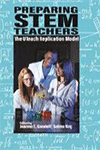
Preparing STEM Teachers
The UTeach Replication Model
Edited by:
Joanne E. Goodell, Cleveland State University
Selma Koç, Cleveland State University
Published 2020
STEM project-based instruction is a pedagogical approach that is gaining popularity across the USA. However, there are very few teacher education programs that focus specifically on preparing graduates to teach in project-based environments. This book is focused on the UTeach program, a STEM teacher education model that is being implemented across the USA in 46 universities. Originally focused only on mathematics and science, many UTeach programs are now offering engineering and computer science licensure programs as well.
This book provides a forum to disseminate how different institutions have implemented the UTeach model in their local context. Topics discussed will include sustainability features of the model, and how program assessment, innovative instructional programming, classroom research and effectiveness research have contributed to its success. The objectives of the book are:
• To help educators gain insight into a teacher education organizational model focused on STEM and how and why it was developed
• To present the theoretical underpinnings of a STEM education model, i.e. deep learning, conceptual understanding
• To present innovative instructional programming in teacher education, i.e. projectbased instruction, functions and modeling, research methods
• To present research and practice in classroom and field implementation and future research recommendations
• To disseminate program assessments and improvement efforts
CONTENTS
Preface, Joanne Goodell and Selma Koç. SECTION I: THE UTEACH MODEL AND ELEMENTS OF SUCCESS. The Development of the UTeach Model, Michael Marder. Implementing and Sustaining UTeach Programs: Lessons Learned from National Expansion, Pamela Romero and Kimberly K. Hughes. Derivatives of the Standard Model, Diane E. Bennett and Joanne E. Goodell. The UTeach Internship Program: Serving the Community and Promoting STEM Education, Shelly R. Rodriguez and Amy L. Moreland. Cross-Pollination in an Unusual Setting: The Success Story of UTeach Dallas, Mary L. Urquhart. Collaboration, Communication and Community: Transitioning from a Traditional Model, Jennifer M. Dechaine and Ian Loverro. The Many Facets of Induction Support, Kelli Allen. UTeach Maker: Preparing Future STEM Educators for Classroom-Based Making, Shelly R. Rodriguez, Jason Harron, and Hannah Smith Brooks. Laboratory Schools to Support the Preparation of UTeach Preservice Teachers, Michael Odell, Teresa Kennedy, Jo Ann Simmons, and Jaclyn Pedersen. Innovative Shared Master Teacher Model: The University of Maryland and a Local School District, Anisha Campbell, Steven Karig, Kayla White, and Julie Brenner. Aligning Field and Classroom Experiences for Secondary STEM Teacher Preparation, Kristen Apraiz, Gayle Nelson Evans, and Thomas Dana. SECTION II: INNOVATIVE INSTRUCTIONAL PROGRAMMING. The UTeach Instructional Program, Elements, and Courses, Kimberly K. Hughes, Ashley R. Welch, and Amy L Moreland. STEM Teaching for Social Justice: Experiences in Early Fieldwork Courses, Anita Sanyal Tudela, Sarah Henson-Darko, Steve Karig, and Kayla White. Steps 1/2 Combo: Summer Field Experiences on Campus and in the Community, Rachelle Haroldson. Incorporating the Clinical Interview Method into the Knowing and Learning in Mathematics and Science Course, Selma Koç. Classroom Interactions: Course Overview and Description of an Innovative Co-Teaching Model, Patrick McGuire and Steve Ottmer. A Tale of Two PBI Classes, Katie Donaldson, Kate York, Robert Gagnon, and Cory Gavitt. The Evidence Behind the UTeach Capstone Course: Does Project-Based Learning Work? Dawn Woods and Candace Walkington. VCAST Learning Modules: A Functions & Modeling Course Innovation, Laurie O. Cavey, Jason Libberton, Tatia Totorica, Michele Carney, and Patrick R. Lowenthal. Benefits of Liberal Arts Curriculum in STEM Teacher Preparation, Gregory D. Gilson. SECTION III: RESEARCH AND FUTURE DIRECTIONS. Developing the UTOP: A Flexible STEM Observation Instrument Based on UTeach Principles, Candace Walkington, Michael Marder, and Elizabeth L. Adams. Developing an Assessment of Attentiveness for Program Evaluation, Leslie Atkins Elliott, Michele Carney, Sara Hagenah, and Tatia Totorica. Promoting Early Career Teacher Resilience Through a CalTeach Preparation Program, Doron Zinger, Therese Shanahan, and Kris Houston. Examining UTeach Graduates’ Employment Choices: Outlining a Framework for Future Research, Michael Horvath, Vasilios D. Kosteas, and Joanne E. Goodell. How Do Intentions to Teach Relate to Recruitment and Retention of UTeach Program Candidates? Melissa Dodson, Whitney Cade, Feng Liu, and Michael Vaden-Kiernan. Computational Thinking for STEM Teacher Leadership Training at Louisiana State University, Fernando Alegre, Juana Moreno, Jerry S. Weltman, David Kirshner, John Arthur Underwood, Frank Neubrander, and James J. Madden. Incorporating Project-Based Learning into the Secondary Mathematics and Science Classroom: Is it Pie in the Sky? David M. Sparks and Debbie Jackson. Exploring the Effectiveness of FSU-Teach Graduates: An Analysis Through the Lens of Induction, Ellen Granger, Sherry A. Southerland, and Robin R. Smith. Examining Retention of UTeach Arlington Graduates in High Need Classrooms, Ann M. L. Cavallo, Gregory R. Hale, and Erin Gonzales.
MORE INFORMATION
Download the introduction by Bernard A. Harris Jr.
-
Paperback978-1-64802-166-4
Web price: $62.04 (Reg. 72.99)
-
Hardcover978-1-64802-167-1
Web price: $89.24 (Reg. 104.99)
- eBook978-1-64802-168-8

- EDU053000 - EDUCATION: Training & Certification
- EDU029010 - EDUCATION: TEACHING METHODS & MATERIALS: Mathematics
- EDU029030 - EDUCATION: TEACHING METHODS & MATERIALS: Science & Technology
-
 A Practical Guide to Exemplary Professional Development Schools
A Practical Guide to Exemplary Professional Development Schools
-
 Beyond Single Stories
Changing Narratives for a Changing World
Beyond Single Stories
Changing Narratives for a Changing World
-
 Contemporary Perspectives on English as a Medium of Instruction
Contemporary Perspectives on English as a Medium of Instruction
-
 Diversity as Strategic Opportunity
Exploring New Paths to Good Administration
Diversity as Strategic Opportunity
Exploring New Paths to Good Administration
-
 The AMTE Handbook of Mathematics Teacher Education
Reflection on Past, Present and Future – Paving the Way for the Future of Mathematics Teacher Education, Volume 5
The AMTE Handbook of Mathematics Teacher Education
Reflection on Past, Present and Future – Paving the Way for the Future of Mathematics Teacher Education, Volume 5
-
 The Handbook for Aspiring Higher Education Leaders
The Handbook for Aspiring Higher Education Leaders
-
 The Undivided Life
Faculty of Color Bringing Our Whole Selves to the Academy
The Undivided Life
Faculty of Color Bringing Our Whole Selves to the Academy

